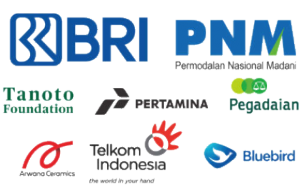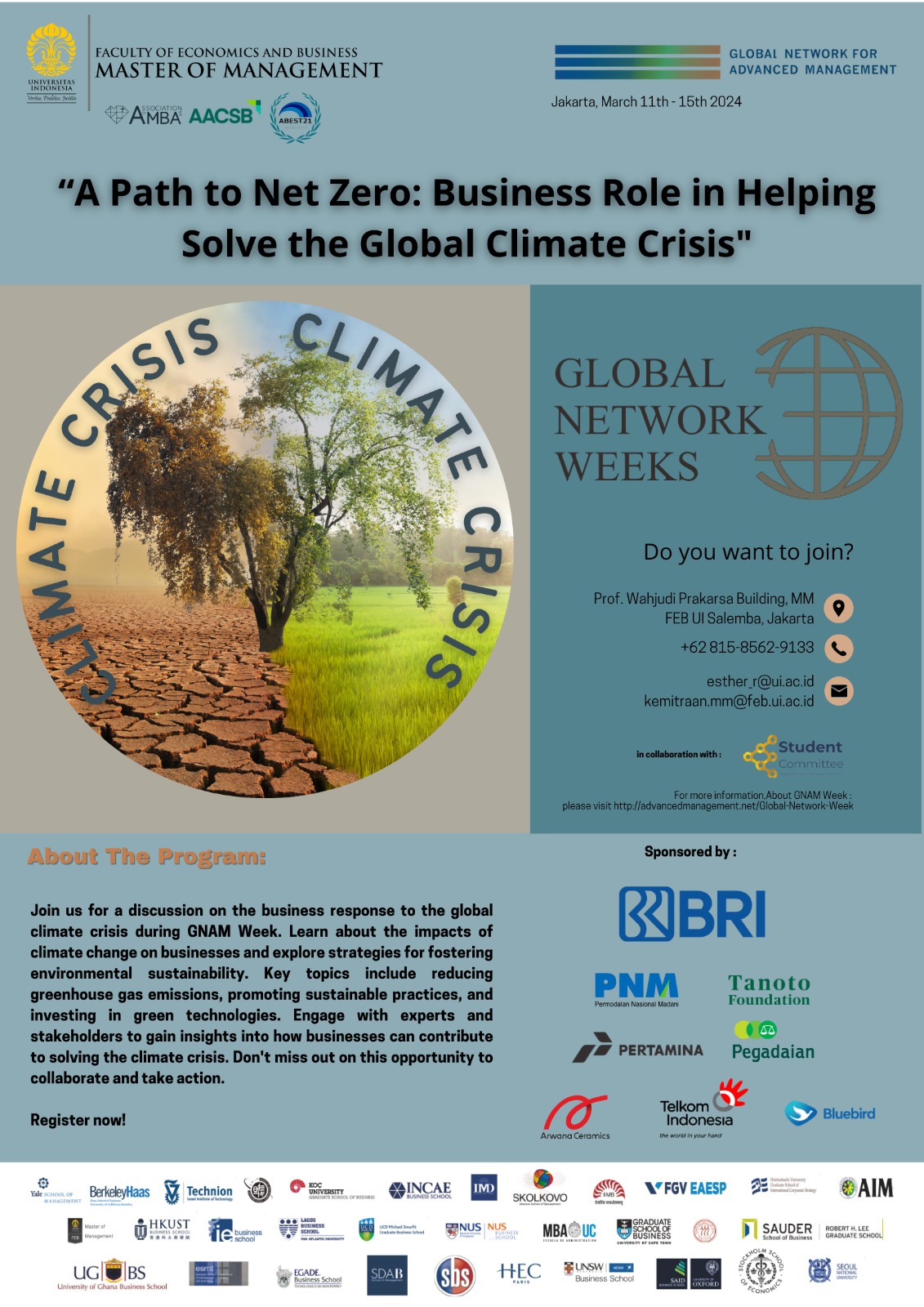DAY 4 GN WEEK 2024 MM FEB UI
Jakarta, March 14th 2024
1st Session
Day 4 opened with a presentation by Dr. Ali Aryo, PMP – the Co-Founder of Alva Energy – and moderated by Putu Geniki Lavinia Natih, S.E. M.Phil., D.Phil discussed the topic of SMEs Role in Helping Solve the Global Climate Crisis. Small and Medium Enterprises (SMEs) play a crucial role in combating climate change and achieving sustainability, particularly in Southeast Asia. With over 100 million SMEs in the East Asia/Pacific Region, including Indonesia, SMEs act as the driving force behind economic growth in the region. However, despite their significant economic contributions, SMEs also contribute to global emissions, making Indonesia one of the largest emitters globally. To address this challenge and harness the potential of SMEs in combating climate change, several strategies can be adopted.
SMEs can enhance their capacity building by leveraging financing and incentives aimed at promoting environmentally sustainable practices. Additionally, embracing green and circular economy principles can help SMEs minimize waste and reduce their carbon footprint. Moreover, adjusting business practices to prioritize sustainability and environmental stewardship is essential. SMEs can implement energy-efficient technologies, adopt renewable energy sources, and integrate eco-friendly processes into their operations.
To wrap up, SMEs have the potential to play a significant role in fighting the global climate crisis by embracing sustainable practices, leveraging financial incentives, and fostering community engagement. Through collective efforts and innovative solutions, SMEs can contribute to building a more sustainable and resilient future for generations to come.
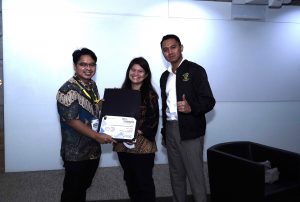
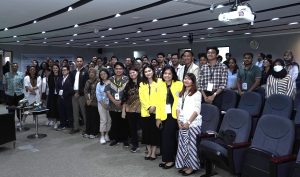
2nd Session
The second session of the day was titled “Providing Sustainable and Environmentally Conscious Electricity: Accelerating Renewable Energy in Indonesia”. Delivered by Arionmaro Simaremare – Manager of Energy Transition at PLN – and moderated by Jonathan Marpaung, PhD, the event promised insights into the nation’s ambitious journey towards a greener, more sustainable energy future. With Indonesia’s growing energy demands and the pressing global call for climate action, the stage was set to share the strategies aimed at accelerating the adoption of renewable energy sources across Indonesia. For 78 years PT Perusahaan Listrik Negara (PLN) has been the backbone of Indonesia’s electrification, powering millions of lives across its vast archipelago. Now, with an ambitious goal to achieve net zero emissions by 2060, PLN is charting a course toward sustainability in a landscape defined by its archipelagic nature.
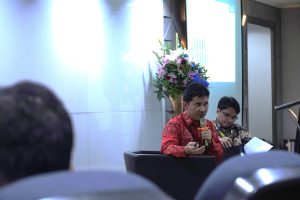
To implement this ambitious vision, PLN is undertaking a multifaceted approach. Recognizing the need to transition away from coal-fired power plants, PLN is pioneering carbon capture and storage (CCS) technologies to mitigate emissions. Additionally, the company is embracing renewable energy sources such as solar and wind power. However, integrating these renewables into the existing energy grid poses challenges, particularly in balancing the intermittency of solar and wind energy. To address this, PLN is developing flexible power generation systems like pumped hydro, which provide a reliable backup to stabilize the grid. Moreover, PLN is innovating in the realm of infrastructure. With land scarcity posing a challenge for solar photovoltaic (PV) installations, PLN is leveraging existing infrastructure such as dams to accommodate more renewable energy capacity.
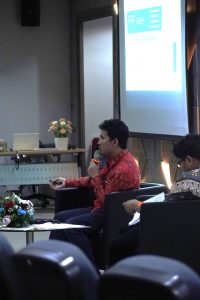
Beyond power generation, PLN is extending its sustainability efforts to the transportation sector. Collaborating with electric vehicle (EV) manufacturers, PLN is spearheading the development of EV charging infrastructure across Indonesia. By promoting the adoption of electric vehicles, PLN aims to reduce dependency on imported fossil fuels and accelerate the transition towards domestic electricity-based transportation systems.
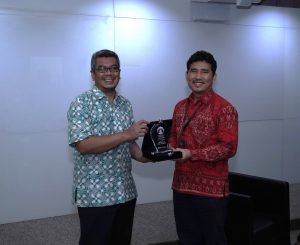
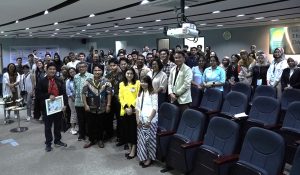
3rd Session
In today’s rapidly changing world, the call for sustainability has become more urgent than ever. As we grapple with environmental challenges and the consequences of climate change, businesses are increasingly being called upon to play a pivotal role in shaping a greener, more sustainable future. At the heart of this movement lies the need for education-based efforts that not only raise awareness but also inspire action and drive meaningful change.
Enter the Matrix of System Learning and Leadership—a powerful framework that offers insights into how organizations can effectively navigate the complexities of sustainability while fostering a green mindset among their stakeholders. This session was delivered by industry thought leader Sihol Parulian Aritonang – President Director of PT Riau Andalan Pulp and Paper – and Nadine Zamira Syarief – Sustainable and ESG Manager of the same company. This discussion was moderated by Karina Wulandari, M.FM, and delved into the essential elements of this matrix and its implications for creating a better future.
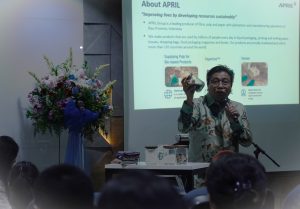
At the core of any sustainable endeavor lies a clear vision of the future we aspire to achieve. Aritonang emphasizes the importance of articulating this vision from the outset, ensuring that it serves as the guiding star for all organizational endeavors. By defining the future, we want to create a future that is environmentally responsible, socially equitable, and economically viable we lay the foundation for meaningful progress.
One of the primary challenges in fostering a green mindset within organizations is persuading stakeholders, particularly board members, to prioritize sustainability as a core business goal. Aritonang underscores the critical importance of aligning sustainability initiatives with the company’s broader objectives, highlighting the inherent benefits of adopting environmentally friendly practices. By framing sustainability as not just a moral imperative but also a strategic business decision – one that is good for the climate, the country, and the customer – organizations can garner greater buy-in from key decision-makers.
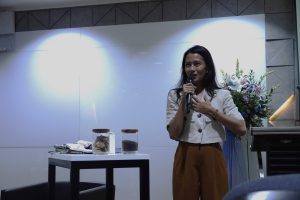
In APRIL Indonesia, evidence-based decision-making is essential for driving meaningful change especially to reduce carbon emissions and to aim towards a climate-positive mission. Aritonang stresses the importance of grounding sustainability efforts in rigorous research and scientific inquiry, ensuring that initiatives are informed by empirical evidence and best practices. By staying updated with the latest developments in sustainability research and understanding how people are engaging with environmental issues, organizations can make informed decisions that yield tangible results.
Besides that, Aritonang highlights the importance of fostering inclusive progress – a collaborative approach that brings together diverse stakeholders to co-create sustainable solutions. By engaging employees, customers, and communities in the sustainability journey, organizations can harness the collective wisdom and creativity of their stakeholders, driving innovation and fostering a sense of ownership. Inclusivity is not only a moral imperative but also a strategic advantage, enabling organizations to tap into new perspectives and forge stronger relationships with their stakeholders.
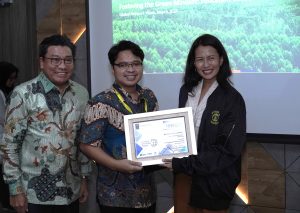
UI-TF GNAM Networking Night
The Networking Night was the last event of the day. It was a chance for GNAM participants to get to know each other better. The event was held at the Sumber Asli Restaurant. It was opened with a speech from Mr. Teguh Dartanto, PhD, the Dean of FEB UI, and representative of GNAM participants from several countries. Right after, the GNAM participants enjoyed their dinner and played group games. Participants enjoyed the traditional dishes that are served by the restaurant, and after having dinner, the participants played some games, which were led by the SC MM UI. The games were a lot of fun. As the fourth day of GNW March 2024 drew to a close, The Networking Night at Sumber Asli Restaurant concluded with a warm and lively atmosphere.
Sponsored by :
